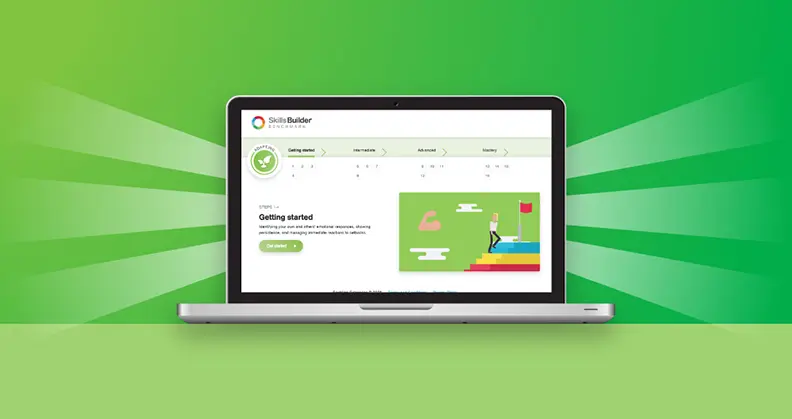It is clear that those working in education are really invested in building essential skills with the children and young people they work with. Recent teacher voice reveals five key motivators for building essential skills:
- preparing students for life
- raising aspirations
- supporting employability
- unlocking learning for all and
- supporting strategic priorities.
A committed cohort of schools and colleges
We’re incredibly proud of this year’s cohort of schools and colleges and the commitment they are making to building essential skills.
Skills Builder research has shown that combining good literacy, numeracy and building essential skills has been shown to have tangible impacts on student outcomes. Without essential skills, an ostensibly “good education” that builds literacy and numeracy is associated with poorer life outcomes (around 18% of full-time workers find themselves in this category).
The most effective interventions to build essential skills are regular, long term, explicit and progressive. So this is why mapping essential skills into the curriculum is so important.
In our latest webinar for Skills Leaders on our programmes, we heard from Charlotte Hubbard - Skills Leader at Newark Hill Primary Academy, who shared their approach to the curriculum:
“We give it (Skills Builder) equal value to any other curriculum subject and I think that’s really important to communicate to parents or anyone visiting our school. It is given that same level of importance and we keep it really high profile.”
Watch the recorded webinar
The live webinar is available to watch now, and covers:
- Research (1:07 mins)
- The Approach (3:12 mins)
- Principle 5: Keep Practising (4:35 mins)
- Guest Speaker: Charlotte Hubbard, Skills Leader & Reception Teacher at Newark Hill Primary Academy (15:10 mins)
Can’t watch now? Here’s a summary of the curriculum mapping webinar:
Research (1:07 mins)
To open the webinar, Education Associate, Jessica Ebrahimi-Sabet shared the latest findings from the Essential Skills Tracker skills research. She highlighted the importance of explicitly building essential skills as well as implicitly integrating them into the existing curriculum.
Reflecting on ‘What is a good education?’, Jess highlighted that around 18% of the working population has an above average education level, including literacy and numeracy knowledge, and yet a very low essential skill score. This group was found to have the worst job and life satisfaction. They also earned much less than their peers.
61% of parents view a school’s provision of skills building opportunities as an important factor when choosing a school for their child, rising to 73% amongst parents with a high skill score.
Given the far ranging impact of essential skill levels, we simply can’t afford to leave to chance who benefits from building them in education and who doesn’t. Thousands of schools and colleges in the UK and across the world have already come to this conclusion. Many of them, through the Accelerator, have achieved excellence in building their students’ essential skills.
The Approach (3:12 mins)
“The school’s curriculum is coherently planned and sequenced towards cumulatively sufficient knowledge and skills for future learning and employment.” Ofsted Inspection Handbook, 2022.
Jess shared how the Universal Framework is a great place to start when considering how to map the skills onto your curriculum. The Framework breaks down eight essential skills into 16 tangible steps, each building on previous learning.
Consequently, by mapping aspects of the Universal Framework into the curriculum, teachers are able to plan sequential learning of skill steps and provide time for deliberate practice. In this way, building essential skills sits alongside the critical knowledge and subject specific skills students are learning.
Principle 5: Keep Practising (4:35 mins)
Next we heard from Miranda, Education Associate and former teacher, who talked about the value of continuous practice and shared many examples of best practice.
All schools working with us on an Accelerator Programme do this as part of embedding Principle 5: Keep Practising, whilst working towards either a Bronze, Silver or Gold Award level.
Many more examples from across schools and colleges within the Partnership can be found on our Case Studies Showcase.
Guest Speaker: Charlotte Hubbard, Skills Leader & Reception Teacher at Newark Hill Primary Academy (15:10 mins)
Here are a few snippets taken from the presentation shared by our guest speaker Charlotte:
“We began our Skills Builder journey in 2020… we really felt that the Skills Builder programme would integrate well into our existing curriculum and support our staff with ways in which to embed the essential skills into their teaching.”
Charlotte talked about how the essential skills are incorporated within whole school curriculum policies and feature in their curriculum intent, implementation and impact statements. She also also shared:
“On our curriculum page on our website, we have a separate Skills Builder section just like we do for any other subject. We give it equal value to any other curriculum subject and I think that’s really important to communicate to parents or anyone visiting our school. It is given that same level of importance and we keep it really high profile.”
Charlotte highlighted a number of really practical examples of how the essential skills and explicit teaching is built into their long and medium term planning, reflecting that:
“Skills Builder is very much embedded into our planning. Our curriculum planning makes reference to opportunities for practising essential skills across all subjects.
The skill icons are referenced and printed on the learning objectives for each of the lessons, so that’s really visual for the children and they know which essential skills they will be using within that particular lesson. This is the same for homework as well… which is another nice way of sharing this with our parents.”
Charlotte then reflected on the impact that embedding essential skills into the curriculum has had on Newark Hill Academy:
“We’ve found it to be really positive - it’s been positive for both our pupils and staff. When I’ve done teacher voice surveys, staff have reported that they found the programme to be really simple and really easy to implement within their existing teaching and also that the resources on the Hub are a good support in delivering effective and engaging explicit teaching opportunities as well.”
Thank you to Charlotte for sharing such a detailed account of the impact their Skills Builder programme is having at Newark Hill Academy. Read the school’s Gold Award Case Study.
Join a movement of educators building essential skills
If you’re currently working with us and want to do more, just get in touch with your Education Associate. If you’re not currently working with us, but interested in building essential skills at your school, applications are open for the 2023-24 Accelerator programme. Find out more and apply online.






